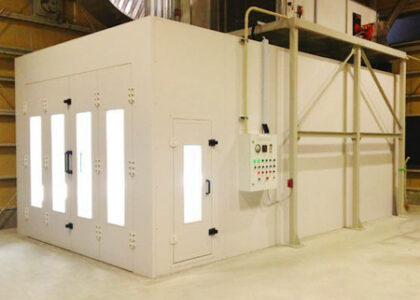Introduction
In the world of home improvement and construction, innovation knows no bounds. One such groundbreaking advancement is the Hybrid Paint Cans Market. These revolutionary containers have been making waves in the painting industry, offering a range of benefits that are hard to overlook. Join us on this journey as we explore the dynamic world of hybrid paint cans and discover what sets them apart.
The Hybrid Paint Cans Market: An Overview
Hybrid paint cans have taken the industry by storm, providing a unique solution for both professionals and DIY enthusiasts. Let’s delve into the details.
The Rise of Hybrid Paint Cans
Hybrid paint cans have rapidly gained popularity due to their exceptional versatility. These containers combine the best features of traditional metal paint cans and modern plastic containers, resulting in a durable, user-friendly, and environmentally conscious packaging solution.
Anticipated to reach a value of US$ 1.2 billion in 2023, the global hybrid paint cans market is projected to experience a steady expansion with a Compound Annual Growth Rate (CAGR) of 4.1%, culminating in a valuation of US$ 1.8 billion by 2033.
The China market is projected to grow at CAGR 4.4% market share during 2023−2033. According to data provided by International Trade Administration, China is one of the largest national markets for construction in the world. It is forecasted to grow at an annual average of 8.6%. The increase in the amount of single person homes, leading to increase in call for fresh housing construction.
Request Sample Report: https://www.futuremarketinsights.com/reports/sample/rep-gb-8014
Key Market Drivers-
- Sustainability and Eco-Friendly Packaging: Growing environmental concerns have driven the adoption of hybrid paint cans, which are often designed to be more sustainable and eco-friendly compared to traditional paint cans made solely of metal or plastic.
- Reduction in Plastic Usage: Hybrid paint cans aim to reduce the use of plastic in packaging, aligning with the global effort to minimize plastic waste and its impact on the environment.
- Lightweight Packaging: Hybrid paint cans are often lighter in weight compared to traditional metal paint cans, which can lead to reduced transportation costs and energy savings.
- Recyclability: Many hybrid paint cans are designed for recyclability, allowing consumers to dispose of them in an environmentally responsible manner and contributing to a circular economy.
- Enhanced Barrier Properties: Hybrid paint cans may incorporate materials that provide improved barrier properties, preventing moisture and air from affecting the paint’s quality and longevity.
- Ease of Use: Hybrid paint cans often offer user-friendly features, such as easy-to-open lids, ergonomic handles, and resealable options, enhancing the consumer experience.
- Customization and Branding: Brands can use hybrid paint cans as a canvas for branding and product differentiation through various design elements and labeling, attracting consumer attention.
Competitive Landscapes
The key players operating in the hybrid paint cans market are trying to focus on increasing their sales and revenues by expanding their capabilities to meet the growing demand. The leading players are trying to adopt a merger & acquisition strategy to expand their resources and are developing new products to meet customer needs. Also, the players are focusing on upgrading their facilities to cater to the demand. Some of the recent developments by the leading players are as follows
- In October 2021, The Cary Company acquires Containers Unlimited a California-based industrial container distributor and reconditioned industry to strengthen their product.
- The Cary Company
- Mauser Packaging Solutions
- Nortan Packaging
- KW Container
- Dominion & Grimm Inc.
- Pipeline Packaging
Key Market Restraints-
- Resistance to Change: The paint industry has a history of using traditional metal or plastic cans, and there may be resistance to adopting hybrid alternatives due to established practices and preferences.
- Limited Material Options: The materials used in hybrid paint cans may not be suitable for all types of paint or coatings, limiting their applicability in certain segments of the paint industry.
- Production Costs: The development and manufacturing of hybrid paint cans, especially those with sustainable features, can be costlier than traditional cans, which may deter some manufacturers from adopting them.
- Recycling Infrastructure: While hybrid cans are designed to be recyclable, the availability and effectiveness of recycling infrastructure can vary by region, which may impact their environmental benefits.
- Consumer Education: Educating consumers about the recyclability and sustainability of hybrid cans can be a challenge, and some consumers may not be aware of the environmental benefits.
- Regulatory Compliance: Meeting environmental regulations and standards can be complex and may require additional investments and efforts in terms of testing and certification.
- Packaging Design Complexity: The design and manufacturing of hybrid paint cans can be more complex due to the combination of materials, which may lead to production challenges.
Request Customization: https://www.futuremarketinsights.com/customization-available/rep-gb-8014
Hybrid Paint Cans Market by Category
By Product Type
- Straight Cans
- Beaded Cans
By Capacity Type
- Below 1000 ml
- 1001–2000 ml
- 2001–3000 ml
- 3001–4000 ml
- Above 4000 ml
By End Use
- Building & Construction
- Automobile
- Textile
- Others (Marine, Aerospace, Electrical & Electronics)
About Future Market Insights (FMI)
Future Market Insights, Inc. (ESOMAR certified, recipient of the Stevie Award, and a member of the Greater New York Chamber of Commerce) offers profound insights into the driving factors that are boosting demand in the market. FMI stands as the leading global provider of market intelligence, advisory services, consulting, and events for the Packaging, Food and Beverage, Consumer, Technology, Healthcare, Industrial, and Chemicals markets. With a vast team of over 5000 analysts worldwide, FMI provides global, regional, and local expertise on diverse domains and industry trends across more than 110 countries.
Contact Us:
Future Market Insights Inc.
Christiana Corporate, 200 Continental Drive,
Suite 401, Newark, Delaware – 19713, USA
T: +1-845-579-5705
For Sales Enquiries: sales@futuremarketinsights.com
Website: https://www.futuremarketinsights.com
LinkedIn| Twitter| Blogs | YouTube


